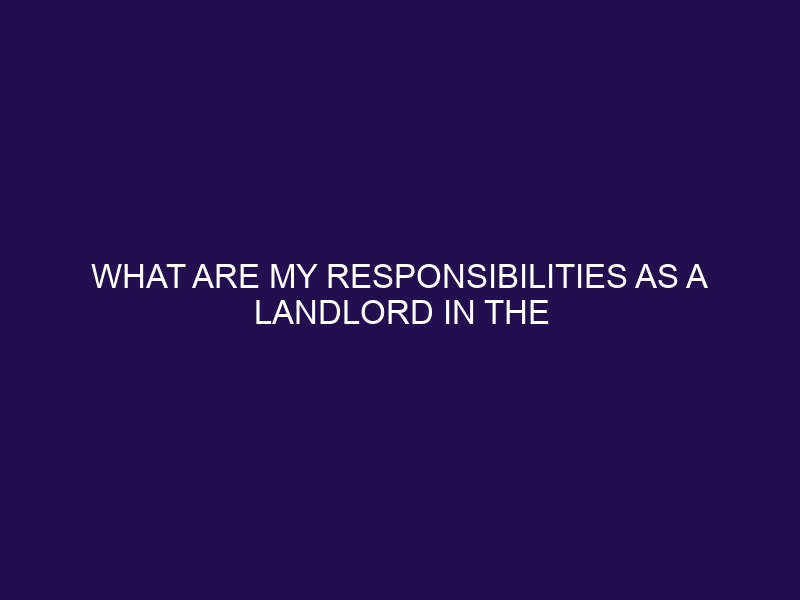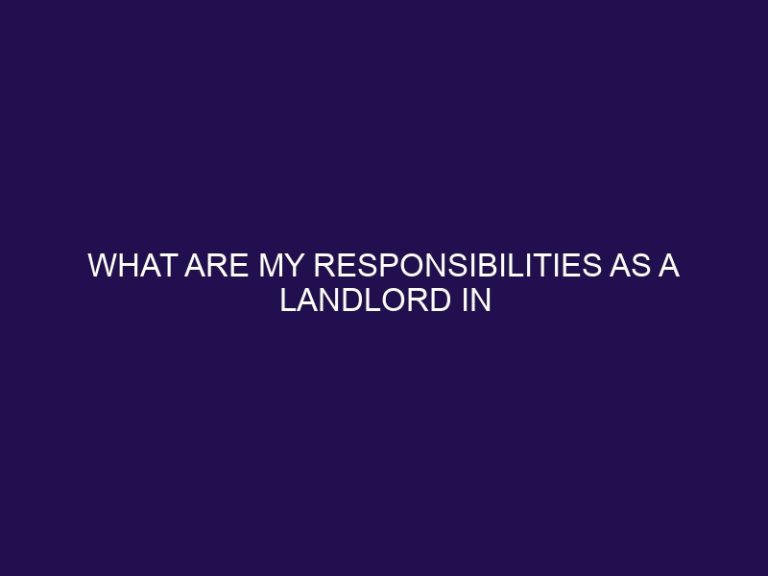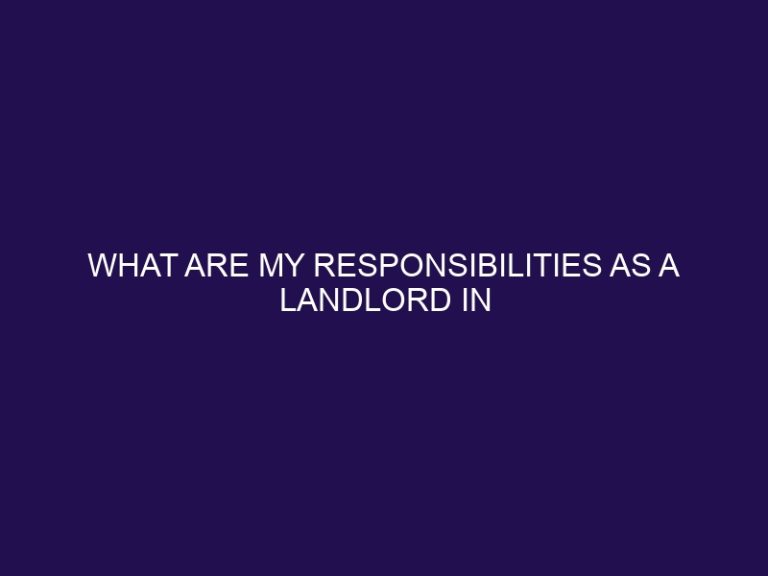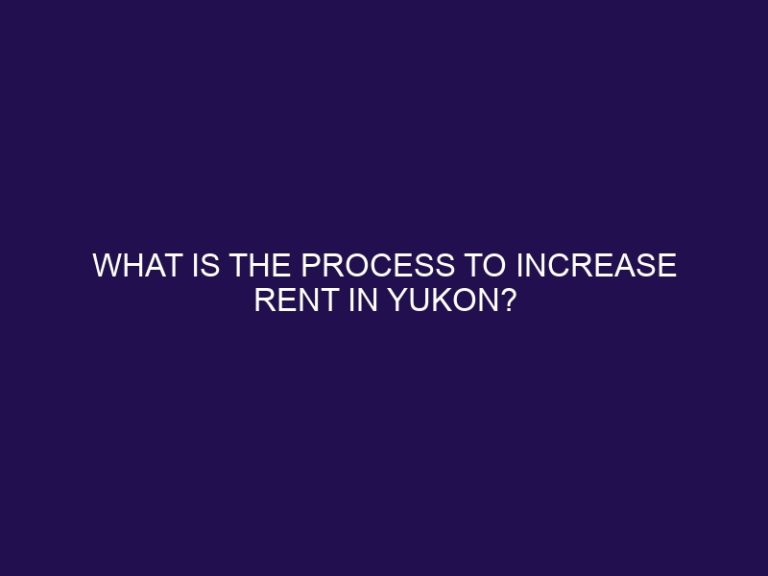What are my responsibilities as a landlord in the Yukon?
.jpg)
Being a landlord in the Yukon comes with specific responsibilities and obligations outlined by laws and regulations. Familiarizing yourself with these guidelines is essential to ensure a positive and legally compliant landlord-tenant relationship. According to the Residential Tenancies Act, there are certain laws and regulations that landlords must adhere to. Rental agreements must meet specific requirements to protect both parties involved.
Before a tenant moves in, landlords have responsibilities to fulfill. These responsibilities include property maintenance and repairs to ensure a safe and clean living environment. Landlords must also provide proper documentation, such as the tenancy agreement and any required disclosures.
During the tenancy, landlords need to handle rent collection, rent increases (within regulated limits), and promptly address repairs and maintenance requests initiated by tenants. Respecting privacy and providing appropriate access to the property are additional considerations during this period.
Ending a tenancy requires following specific procedures. This includes providing proper notice to the tenant, returning security deposits in a timely manner, and understanding the processes and regulations related to evictions and dispute resolution.
In addition to these core responsibilities, landlords should also consider factors such as insurance and liability coverage, establishing policies regarding pets and smoking, and being aware of the Landlord and Tenant Board in case of any disputes or legal matters. By understanding and fulfilling these responsibilities, landlords can maintain a harmonious and compliant landlord-tenant relationship in the Yukon.
Key takeaway:
- Residential Tenancies Act: Landlords in the Yukon must adhere to the regulations outlined in the Residential Tenancies Act, which governs their responsibilities towards tenants.
- Maintaining and ensuring a safe property: Landlords are responsible for maintaining the property and ensuring it is safe and clean for tenants to live in.
- Ending a tenancy: Landlords must follow proper protocols for ending a tenancy, including giving notice to the tenant, returning security deposits, and resolving any disputes or evictions through the appropriate channels.
Laws and Regulations for Landlords in the Yukon
Navigating the world of being a landlord in the Yukon requires a solid understanding of the laws and regulations that govern this role. In this section, we’ll dive into the key aspects of the Residential Tenancies Act and the essential rental agreement requirements. Get ready to uncover vital information that every landlord in the Yukon needs to know for a successful and legally compliant rental journey.
1. Residential Tenancies Act
The Residential Tenancies Act is a crucial piece of legislation that governs landlord-tenant relationships in the Yukon. This act outlines the rights and responsibilities of both parties involved in a rental agreement. Landlords must adhere to the provisions of the Residential Tenancies Act, which includes obligations such as maintaining the property, ensuring a safe and clean environment, and providing proper documentation to the tenant. The Residential Tenancies Act provides guidelines for rent collection, handling repairs and maintenance, and privacy rights during the tenancy. Familiarizing oneself with the Residential Tenancies Act is essential for landlords to ensure they meet their legal obligations and maintain a positive landlord-tenant relationship.
2. Rental Agreement Requirements
When entering into a rental agreement in the Yukon, both landlords and tenants must adhere to specific rental agreement requirements.
- Written agreement: It is essential to have a written agreement that outlines the terms and conditions of the tenancy.
- Lease term: The agreement should specify the duration of the lease, whether it is a fixed term or a month-to-month agreement.
- Rent amount and payment: The rental agreement must clearly state the amount of rent and the acceptable methods of payment.
- Security deposit: If a security deposit is collected, the rental agreement should outline the amount and the conditions for its return.
- Utility responsibilities: The agreement should specify who is responsible for paying utilities, such as electricity, water, and heating.
- Repairs and maintenance: The rental agreement should address the landlord’s responsibilities for repairs and maintenance.
Responsibilities Before a Tenant Moves In
Before your tenant sets foot in your property, there are crucial responsibilities that you, as a landlord in the Yukon, must fulfill. From property maintenance and repairs to ensuring a safe and clean environment, and providing the necessary documentation, this section will walk you through the essential tasks that lay the foundation for a successful landlord-tenant relationship. Get ready to dive into the key responsibilities that should be undertaken before your tenant moves in.
1. Property Maintenance and Repairs
Maintaining and repairing rental properties is a crucial responsibility for landlords. To ensure tenant satisfaction and uphold legal obligations, landlords should focus on the following:
- Regular inspections: Schedule routine inspections to identify and address any maintenance issues promptly.
- Prompt repairs: Respond to tenant requests for repairs promptly and efficiently to ensure the property remains in good condition.
- Upkeep of common areas: Landlords should be responsible for property maintenance and repairs, including maintaining common areas such as hallways, staircases, and gardens.
- Emergency repairs: Landlords must ensure that emergency repairs, such as plumbing or electrical issues, are fixed immediately to ensure tenants’ safety.
- Documenting maintenance: Keep a record of all property maintenance and repair work done, including dates, descriptions, and costs.
By prioritizing property maintenance and repairs, landlords can create a safe and comfortable living environment for their tenants, reducing the likelihood of disputes and ensuring a positive rental experience.
2. Ensuring a Safe and Clean Property
Ensuring the safety and cleanliness of a property is a vital responsibility for landlords in the Yukon. It is crucial for them to maintain the property in accordance with safety standards and provide a hygienic living environment for tenants. Landlords should conduct regular inspections and promptly address any potential hazards or maintenance issues that may arise. To ensure cleanliness, it is essential for them to implement proper waste disposal and pest control measures. Furthermore, landlords should inform tenants about emergency procedures and provide safety features such as smoke detectors. By prioritizing the safety and cleanliness of their properties, landlords can create a comfortable and conducive living environment for tenants.
In a similar vein, the establishment of the first public health department in 19th-century London serves as a notable historical example of ensuring a safe and clean property. Dr. John Snow played a significant role in this regard when he identified contaminated water sources as the cause of a cholera outbreak. Dr. Snow advocated for clean drinking water and improved sanitation, leading to the implementation of regulations for cleanliness and safety. This groundbreaking development brought about a revolution in public health practices and significantly improved the living conditions of countless individuals.
3. Providing Proper Documentation
When it comes to providing proper documentation as a landlord in the Yukon, the key focus is on “Providing Proper Documentation.” To successfully meet this requirement, follow these essential steps:
-
Prepare a comprehensive rental agreement that outlines the terms and conditions of the tenancy, including rent amount, payment schedule, and property rules.
-
Ensure that both you and the tenant sign the rental agreement to verify that both parties understand and agree to the terms.
-
Provide the tenant with a copy of the signed rental agreement for their records and as evidence of “Providing Proper Documentation.”
-
Give the tenant any necessary legal documents, such as a copy of the Residential Tenancies Act or any additional addendums or disclosures required by law, contributing to “Providing Proper Documentation.”
-
Keep a record of all documentation provided to the tenant in case it is needed for future reference or legal purposes, which is an integral part of “Providing Proper Documentation.”
By adhering to these steps, you can guarantee compliance with the mandate of “Providing Proper Documentation” as a landlord in the Yukon.
During the Tenancy
As we delve into the “During the Tenancy” phase, let’s unveil the crucial aspects every landlord in the Yukon must be mindful of. From rent collection and increases, to managing repairs and maintenance, to ensuring privacy and appropriate access to the property – every sub-section of this journey comes with its own set of responsibilities. So, let’s break them down and explore the ins and outs of being a responsible and effective landlord in the Yukon.
1. Rent Collection and Rent Increases
Rent collection and rent increases are crucial obligations for landlords in the Yukon. Landlords must ensure that rent is collected punctually, typically on a monthly basis, as agreed upon in the rental agreement. They have the option to collect rent either in person, through mail, or via online payment systems. Conversely, rent increases must adhere to the regulations outlined in the Residential Tenancies Act. Landlords must provide tenants with appropriate notice before raising the rent, and the increase must fall within the permissible limits set forth by the Act. It is essential for landlords to remain well-informed regarding the rules and regulations pertaining to rent collection and increases in order to fulfill these duties responsibly.
Similarly, in 1976, a significant event occurred in New York City relating to rent collection and increases. The city was grappling with a housing crisis, and tenants were facing difficulties due to rapidly rising rents. In response, the New York State government enacted the Rent Stabilization Law, which imposed limits on rent increases and safeguarded tenants against unfair practices. This landmark legislation aimed to ensure affordable housing and maintain stability for tenants in the city, underscoring the importance of rent collection and increases within the context of tenant rights and housing affordability.
2. Handling Repairs and Maintenance
Handling repairs and maintenance as a landlord in the Yukon involves a set of steps to ensure the property is kept in good condition and meet the legal requirements. Here are the key steps to follow:
- Respond promptly to repair requests from tenants.
- Notify tenants in advance when entering the property for repairs.
- Arrange for qualified professionals to handle repairs and maintenance tasks.
- Maintain a record of all repairs conducted, including dates and costs.
- Regularly inspect the property to identify maintenance needs.
- Keep the property safe and habitable by addressing any safety or health hazards.
- Follow all applicable laws and regulations regarding repairs and maintenance.
Fact: Landlords are responsible for handling repairs and maintenance of their properties in the Yukon. They need to ensure that the property is in a condition that meets the health, safety, and housing standards set by the Residential Tenancies Act.
3. Privacy and Access to the Property
When renting out a property in the Yukon, landlords have specific responsibilities regarding privacy and access to the property. These include:
- – Respecting the tenant’s right to privacy and only entering the property with proper notice and for valid reasons.
- – Following the guidelines outlined in the Residential Tenancies Act regarding access to the property, such as providing reasonable notice before entering and obtaining consent for non-emergency repairs.
- – Communicating openly with tenants to address any concerns or issues regarding privacy or access to the property.
- – Maintaining documentation of all requests and notifications related to privacy and access, in case disputes arise in the future.
Landlords in the Yukon must prioritize privacy and access to the property of their tenants. As such, they must respect tenants’ right to privacy and should only enter the property after giving proper notice and for valid reasons. In accordance with the Residential Tenancies Act, landlords should abide by the guidelines pertaining to property access, which includes providing reasonable notice before entering and obtaining consent for non-emergency repairs. Effective communication with tenants is crucial to addressing any privacy or access concerns. Landlords are also advised to maintain documentation of all privacy and access-related requests and notifications, which can be helpful in case any disputes arise in the future.
Ending a Tenancy
When it’s time to part ways with your tenant in the Yukon, it’s important to know the ins and outs of ending a tenancy. In this section, we’ll explore the crucial steps involved in this process and how it affects both landlords and tenants. Get ready to discover the nuances of giving notice, handling security deposits, and navigating evictions and dispute resolution. Buckle up, because we’re about to dive into the nitty-gritty of ending a tenancy in the Yukon!
1. Giving Notice to the Tenant
Giving notice to the tenant is a crucial responsibility of landlords in the Yukon. Here are the steps involved:
- Determine the type of tenancy: Before giving notice, ascertain whether it’s a periodic tenancy or a fixed-term tenancy.
- Review the notice requirements: Familiarize yourself with the specific notice period required for the type of tenancy.
- Prepare the notice: Compose a written notice clearly stating the intention to terminate the tenancy.
- Provide the notice: Serve the notice to the tenant through personal delivery or registered mail.
- Keep records: Retain copies of the notice and proof of delivery for future reference.
Properly giving notice ensures compliance with regulations and safeguards the rights of both landlords and tenants.
2. Returning Security Deposits
Returning security deposits properly is of utmost importance for landlords in the Yukon. Here is a step-by-step guide to follow:
- Thoroughly inspect the rental unit to assess any damages beyond ordinary wear and tear.
- Utilize photographs or written descriptions to document any damages discovered.
- Evaluate the cost required for repairing or cleaning the damages.
- Subtract the necessary amount from the security deposit to cover these expenses.
- Furnish the tenant with a detailed statement outlining the deductions made.
- Ensure the remaining portion of the security deposit is returned within 15 days.
- Safeguard copies of all the documents associated with the security deposit for record-keeping purposes.
3. Evictions and Dispute Resolution
- Step 1: Communicate with the tenant: Attempt to resolve any issues or disputes regarding evictions and dispute resolution through open and honest communication.
- Step 2: Serve an eviction notice: If communication fails, serve a formal eviction notice to the tenant, specifying the grounds for eviction related to evictions and dispute resolution.
- Step 3: Apply to Residential Tenancy Office: File an application for eviction related to evictions and dispute resolution with the Residential Tenancy Office, providing all necessary documentation.
- Step 4: Attend dispute resolution hearing: Both parties will attend a hearing to present their case and attempt to reach a resolution regarding evictions and dispute resolution.
- Step 5: Obtain eviction order: If the dispute remains unresolved, the landlord may obtain an eviction order from the Residential Tenancy Office regarding evictions and dispute resolution.
- Step 6: Enforce eviction order: With the eviction order in hand, the landlord can coordinate with law enforcement to physically remove the tenant from the property regarding evictions and dispute resolution.
Fun Fact: In the Yukon, landlords can evict tenants for reasons such as non-payment of rent, illegal activities, or significant damage to the property related to evictions and dispute resolution.
Additional Responsibilities and Considerations
When it comes to being a landlord in the Yukon, there are some additional responsibilities and considerations that you need to be aware of. In this section, we’ll dive into three key areas: insurance and liability, pets and smoking policies, and the role of the Landlord and Tenant Board. Buckle up and let’s explore the ins and outs of these crucial aspects for landlords in the Yukon.
1. Insurance and Liability
As a landlord in the Yukon, it is crucial to comprehend your insurance and liability responsibilities. Insurance coverage is of utmost importance to safeguard your property from unexpected events, including fire or natural disasters. Equally significant is liability insurance, as it provides coverage for any injuries or accidents that may transpire on your property. It is advisable to consider implementing safety measures like regular property inspections and maintenance to mitigate the risk of accidents.
Regrettably, a Yukon landlord failed to procure proper insurance coverage for their rental property. Unfortunately, a fire inflicted extensive damage upon the building, thereby holding the landlord accountable for the resulting losses. This incident clearly underscores the significance of insurance and the potential financial ramifications of neglecting this responsibility.
2. Pets and Smoking Policies
When it comes to pets and smoking policies, landlords in the Yukon have certain responsibilities and considerations to keep in mind:
- Pets: Landlords have the right to establish rules regarding pets in their rental properties. They can choose to allow or prohibit pets altogether, or impose restrictions such as size, breed, or number of pets.
- Smoking: Landlords can decide whether smoking is allowed or not in their rental units. They can choose to implement a no-smoking policy throughout the property or designate specific areas for smoking.
- Lease Agreements: It is important for landlords to clearly outline their policies on pets and smoking in the lease agreement to avoid any disputes or misunderstandings with tenants.
3. Landlord and Tenant Board
The Landlord and Tenant Board in the Yukon, also known as the Landlord and Tenant Board, is responsible for resolving disputes between landlords and tenants and enforcing the Residential Tenancies Act. It provides a formal process for resolving issues such as unpaid rent, eviction notices, and breaches of the rental agreement. Landlords must adhere to the Landlord and Tenant Board’s regulations and guidelines, such as providing proper notice to tenants and following the correct procedures for evictions. It is important for landlords to familiarize themselves with the rules and regulations set forth by the Landlord and Tenant Board to avoid legal issues and ensure a fair and harmonious landlord-tenant relationship.
Facts:
Some Facts About Landlord Responsibilities in the Yukon:
- ✅ A written lease is not required in Yukon, but it is recommended for landlords and tenants. (Source: ezlandlordforms.com)
- ✅ The landlord is responsible for maintaining the rental premises and ensuring compliance with health, safety, and maintenance laws. (Source: ezlandlordforms.com)
- ✅ Rent receipts must be provided by the landlord upon request from the tenant. (Source: ezlandlordforms.com)
- ✅ A security deposit in Yukon can be no more than the equivalent of one month’s rent and can only be used for the last month’s rent or for damages caused, with a signed condition report. (Source: ezlandlordforms.com)
- ✅ Landlords in Yukon require written notice at least 24 hours in advance to enter the rented premises, between 8 am and 9 pm, unless consent is given by the tenant or in case of an emergency. (Source: ezlandlordforms.com)
Frequently Asked Questions
What are my responsibilities as a landlord in the Yukon?
As a landlord in the Yukon, you have several key responsibilities:
– You must ensure that the rental premises meet the minimum rental standards.
– It is recommended to have a written lease agreement with your tenant, although it is not required. If the agreement is written, it must be signed by both parties, and a duplicate copy must be delivered to the tenant within 21 days.
– You are responsible for maintaining the rental premises and complying with all health, safety, and maintenance laws.
– You must provide rent receipts to your tenant upon request.
– If you collect a security deposit, it cannot exceed the amount equal to one month’s rent. The deposit can only be used for the last month’s rent, unless a condition report is signed allowing deductions for damages caused.
– If you need to enter the rented premises, you are required to provide the tenant with 24 hours written notice between 8 am and 9 pm, unless the tenant gives consent or in case of an emergency.
What are my responsibilities as a tenant in the Yukon?
As a tenant in the Yukon, you also have important responsibilities:
– You should familiarize yourself with the Yukon rental rules and regulations before renting a residential property or unit.
– If you have a written tenancy agreement, you must sign and date it. The landlord must provide you with a copy of the agreement.
– Before moving in, you should complete a condition inspection report together with the landlord. The landlord must provide you with a copy of the report within 14 days of the inspection.
– You are responsible for any damages caused by yourself, your family, or your invitees.
– You must pay the rent on time and you have the right to request rent receipts from your landlord.
– If you plan to terminate the tenancy, you must provide written notice to the landlord with the appropriate notice period, based on the type of tenancy agreement.
Do I need to have a written lease in the Yukon?
No, it is not required to have a written lease in the Yukon. However, it is highly recommended for both landlords and tenants to have a written lease agreement. If the tenancy agreement is written, it must be signed by both parties, and a duplicate copy must be delivered to the tenant within 21 days.
What is the maximum security deposit allowed in the Yukon?
The maximum security deposit allowed in the Yukon is equivalent to one month’s rent. The security deposit can only be used for the last month’s rent, unless a condition report is signed, allowing deductions for damages caused.
Can a landlord increase the rent in the Yukon?
Rent increases are not permitted for tenancies less than 1 year or in the first year of a tenancy.
What are the entry rights of landlords in the Yukon?
In the Yukon, landlords must provide tenants with 24 hours written notice to enter the rented premises. This notice should be given between 8 am and 9 pm, unless the tenant gives consent or in case of an emergency.







